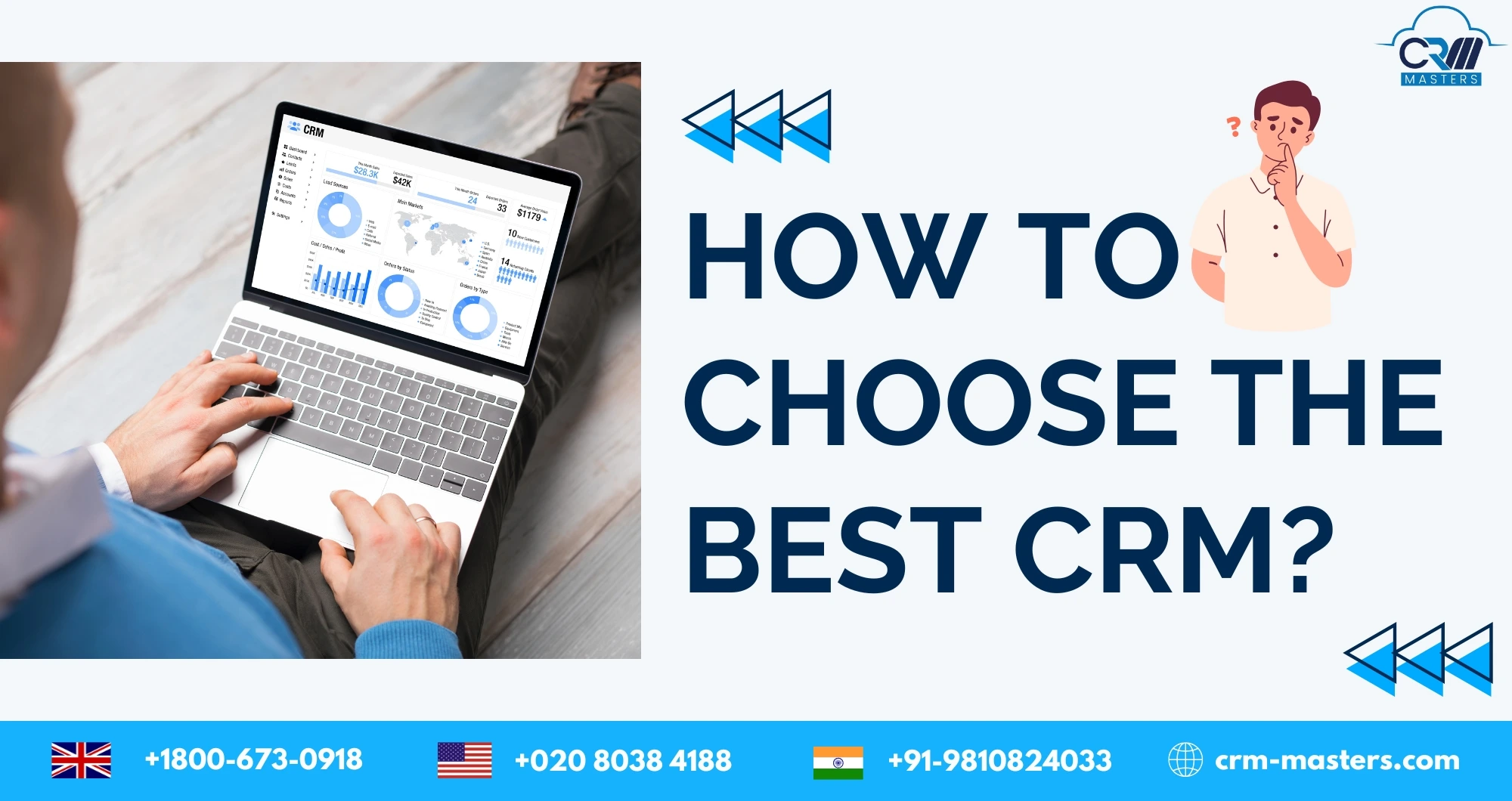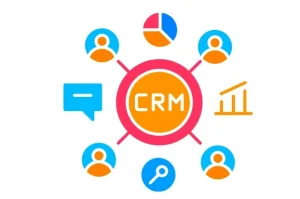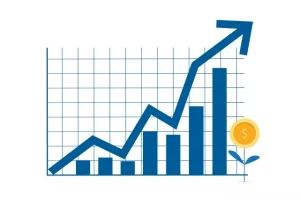
How to Choose the Best CRM for Your Business?
Imagine having a clear, 360-degree view of every customer, knowing exactly what they need, when they need it, and how to serve them better than anyone else. That’s the power of a great CRM. But here’s the catch: with hundreds of options out there, choosing the wrong CRM can be costly, time-consuming, and frustrating. The right one, on the other hand? It can streamline your sales, supercharge your marketing, and transform your customer relationships.
Whether you’re a startup looking to scale or an established business ready to optimize, this blog will help you cut through the noise. We will learn the key aspects that truly matter, so you can make a smart, confident choice that fuels your growth.
Let’s find the CRM that works for your business.
What is CRM Software?

CRM software helps businesses manage their interactions with current and potential customers. This software helps you to bring all your customer data together in one place, tracks communications, automates tasks, and opens a window to all customer interactions to help you close more sales.
With the right CRM software, you will get customer information, contact details, purchase history, preferences, and communication records stored in one place and accessible to your sales, marketing, and customer service teams. This unified view enables personalized customer experiences, efficient lead management, and data-driven decision-making.
Types of CRM Software
Understanding the different types of CRM systems helps you choose one that aligns with your business needs:
1. Operational CRM
Operational CRM focus on automating customer-centric processes, including sales, marketing and service. It is great for businesses that are looking to optimise their daily operations and enhance efficiency.
2. Analytical CRM
Analytic CRM focuses on analyzing data concerning the behaviour of customers and the patterns of customers’ preferences. This can help your business to make the right choice by using customer information and trends.
3. Collaborative CRM
This type of CRM encourages communication and information sharing across an organization’s various departments (e.g., sales, marketing, and customer service). This guarantees consistent handling of the customer.
4. Strategic CRM
Strategic CRM long-term relationship and engagement initiatives with its customers. It incorporates an understanding of customers in overall business planning.
Why Does Your Business Need the Best CRM Software?
Many businesses underestimate the power of a good CRM system. Here are the key reasons why your business needs CRM software:
1. Centralized Customer Data

Without CRM, customer data is often spread out in spreadsheets, emails, and different programs, which can cause problems and mistakes. CRM software consolidates all this data into one place, ensuring your team has instant access to accurate and up-to-date customer information.
2. Streamlined Sales Process

CRM tools help sales teams manage leads, track deals through various stages, and prioritize prospects. Features like sales tracking and automatic follow-ups make sure opportunities are not missed.
3. Enhanced Customer Service

With CRM, customer service reps have access to full interaction history, enabling them to resolve issues faster and provide personalized support, which boosts customer satisfaction and loyalty.
4. Marketing Automation
Modern CRMs often include marketing automation capabilities such as email campaigns, lead management, and segmentation. This helps businesses target the right audience with relevant messages, increasing conversion rates.
5. Data-Driven Decisions
CRM analytics give useful information about customer habits, sales results, and how well campaigns work. These insights empower managers to make informed strategic decisions.
6. Improved Collaboration
CRM systems facilitate better communication and collaboration across departments by sharing customer information and notes, ensuring everyone is on the same page.
7. Scalability
As your business grows, CRM software can grow with you, allowing more users and data without losing effectiveness.
Benefits of a Good CRM Software
Investing in a good CRM system has many advantages:
1. Increased Sales
By managing leads effectively and automating follow-ups, CRM helps sales teams close deals faster and increase revenue.
2. Better Customer Retention
Personalized communication and timely support foster stronger relationships, reducing churn rates.
3. Enhanced Productivity
Automation of repetitive tasks frees up your team to focus on high-value activities.
4. Improved Customer Insights
Comprehensive analytics enable you to understand customer needs and tailor your offerings accordingly.
5. Cost Efficiency
CRM reduces operational costs and marketing waste by streamlining processes and improving targeting.
6. Competitive Advantage
Businesses that use CRM can respond quickly to changes in the market and what customers want, keeping them ahead of competitors.
How to Choose the Best CRM for Your Business?
Choosing the perfect CRM for your business requires careful consideration of your business’s unique needs and future goals. Below are a few points to consider before choosing the crm software.
1. Define Your Business Objectives
To begin with, you must determine your business goals with a CRM. Is it improving sales pipeline visibility, automating marketing campaigns, enhancing customer support, or all of these? Clear objectives will guide your selection process.
2. Understand Your Users Needs
Consult with sales, marketing, and customer service teams to understand their pain points and feature requirements, as it is important for successful CRM adoption.
3. Define Your Budget
Before diving into CRM features, it’s important to get clear on how much you’re willing to invest. CRMs range from free versions with basic capabilities to enterprise-grade platforms with custom pricing. Be realistic about what you can afford, but also consider the value a good CRM can bring in terms of saved time, improved customer retention, and increased sales. Look for pricing that scales with your growth, and beware of hidden costs for add-ons or user limits.
4. Evaluate Features and Functionality
Look for essential features such as
- Contact and lead management
- Sales Monitoring
- Automation
- Analytics
- Reports
- Mobile friendly
- Customization
- Third Party Integration
5. Consider Ease of Use
An easy-to-use design makes it simple to learn and reduces training time. Request demos or trials to assess usability.
6. Check Integration Capabilities
Your CRM should fit into your workflow, not disrupt it. Does it integrate smoothly with your existing tools like email platforms, marketing automation software, accounting systems, or your website? Seamless integration helps reduce manual data entry, improves productivity, and ensures all your systems are speaking the same language. A CRM that supports APIs or offers a wide app marketplace is a huge plus.
7. Mobile Accessibility
This is one of the most critical things to keep in mind, since in many cases your staff will be travelling while working (e.g. sales group). While you are the decision-maker, you have to make CRM extremely accessible on your mobile phones. All you can do and all you can report from your CRM needs to be on your mobile as well to keep things running and operational while you are on the move. At this time, select the top CRM software of 2025 that allows you to have smooth mobile access.
8. Review Security and Compliance
Ensure the CRM provider follows industry-standard security protocols and complies with relevant regulations like GDPR or HIPAA.
9. 24/7 Customer Support
Even the best software can run into issues, and when it does, you want to know help is just a click or call away. Choose a CRM provider that offers 24/7 customer support through multiple channels like live chat, phone, and email. Also choose those who have a robust help centre, training videos, and a supportive user community to help you troubleshoot and grow confidently.
10. Better Scalability
With the growth of your customer base and operations, your CRM software needs to have enough storage and perform well. The one you decide to choose must be able to change, transform and scale with your business. Make sure the CRM system you select is scalable for your business.
Also Read:- Amazon Connect integrated with Zoho CRM System
Get the Best CRM Software with CRM Masters

Choosing the best CRM software can be confusing with so many options out there. That’s why we are here to help. As a trusted CRM Service Provider, we will help you to find the perfect CRM that fits your business.
We understand that every business is different. Whether you want a simple, affordable CRM like Zoho or a powerful, advanced system like Salesforce, we will guide you through the entire process. Our team understand your needs, setting up the software, training your team, to supporting you as you grow, we are with you every step of the way.
Our goal is to help you get a CRM that makes your work easier, helps you connect better with your customers, and helps your business grow. With our support, you’re not just getting software but you’re getting a partner who cares about your success.
Partner with us to boost sales and enhance customer satisfaction.












